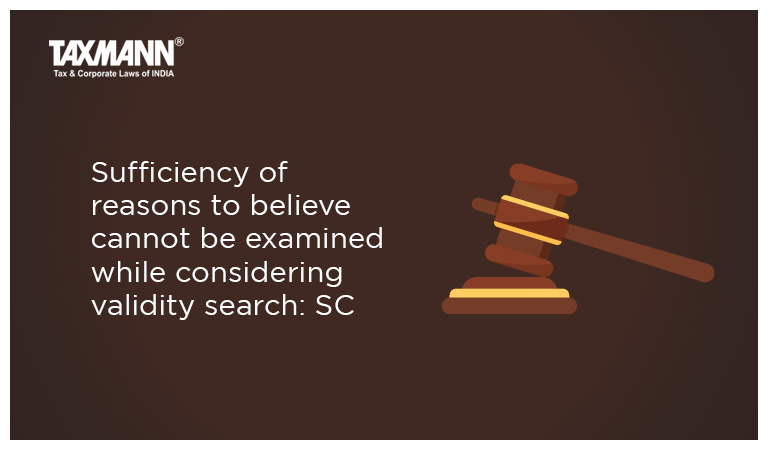Sufficiency of reasons to believe cannot be examined while considering validity search: SC
- Blog|News|Income Tax|
- 3 Min Read
- By Taxmann
- |
- Last Updated on 15 July, 2022

Case Details: PCIT (Investigation) v. Laljibhai Kanjibhai Mandalia - [2022] 140 taxmann.com 282 (SC)
Judiciary and Counsel Details
-
- Hemant Gupta & V. Ramasubramanian, JJ.
Facts of the Case
The instant appeal was filed by the revenue against the order of the Gujarat High Court wherein it was held that authorization to search the premises of the assessee was invalid and couldn’t be sustained. The assessee had challenged the act of authorization for search and seizure on the ground that it was a fishing enquiry.
The High Court held that none of the reasons to believe to issue authorization met the requirement of Section 132(1)(a), (b), and (c).
Supreme Court Held
The Supreme Court held that reasons to believe are not the final conclusions which the revenue would arrive at while framing block assessment in terms of Chapter XIV-B of the Act. The reply in the counter affidavit shows that the intention of the Revenue was to un-layer the layering of money which is suspected to be done by the assessee.
The sufficiency or inadequacy of the reasons to believe recorded cannot be gone into while considering the validity of an act of authorization to conduct search and seizure. The belief recorded alone is justiciable but only while keeping in view the Wednesbury Principle of Reasonableness. Such reasonableness is not a power to act as an appellate authority over the reasons to believe recorded.
The Supreme Court has restated and elaborated the principles in exercising the writ jurisdiction in the matter of search and seizure under Section 132 which are as follows:
a) The formation of opinion and the reasons to believe recorded is not a judicial or quasi-judicial function but administrative in character. The information must be in possession of the authorized official based on the material and the formation of opinion must be honest and bona fide.
b) A reasonable belief can be founded by authority that:
-
-
-
- The person concerned has omitted or failed to produce books of accounts or other documents for the production of which summons or notice had been issued, or such person will not produce such books of accounts or other documents even if summons or notice is issued to him; or
- Such person has any money, bullion, jewellery, or other valuable article which represents either wholly or partly income or property which has not been or would not be disclosed.
-
-
c) Such reasons may have to be placed before the High Court in the event of a challenge to the formation of the belief of the competent authority in which event the Court would be entitled to examine the reasons for the formation of the belief, though not the sufficiency or adequacy thereof.
d) Such reasons forming part of the satisfaction note are to satisfy the judicial consciousness of the Court and any part of such satisfaction note is not to be made part of the order.
e) The question as to whether such reasons are adequate or not is not a matter for the Court to review in a writ petition. The sufficiency of the grounds which induced the competent authority to act is not a justiciable issue.
f) The relevance of the reasons for the formation of the belief is to be tested by the judicial restraint as in administrative action as the Court does not sit as a Court of appeal but merely reviews the manner in which the decision was made. The Court shall not examine the sufficiency or adequacy thereof.
Disclaimer: The content/information published on the website is only for general information of the user and shall not be construed as legal advice. While the Taxmann has exercised reasonable efforts to ensure the veracity of information/content published, Taxmann shall be under no liability in any manner whatsoever for incorrect information, if any.

Taxmann Publications has a dedicated in-house Research & Editorial Team. This team consists of a team of Chartered Accountants, Company Secretaries, and Lawyers. This team works under the guidance and supervision of editor-in-chief Mr Rakesh Bhargava.
The Research and Editorial Team is responsible for developing reliable and accurate content for the readers. The team follows the six-sigma approach to achieve the benchmark of zero error in its publications and research platforms. The team ensures that the following publication guidelines are thoroughly followed while developing the content:
- The statutory material is obtained only from the authorized and reliable sources
- All the latest developments in the judicial and legislative fields are covered
- Prepare the analytical write-ups on current, controversial, and important issues to help the readers to understand the concept and its implications
- Every content published by Taxmann is complete, accurate and lucid
- All evidence-based statements are supported with proper reference to Section, Circular No., Notification No. or citations
- The golden rules of grammar, style and consistency are thoroughly followed
- Font and size that’s easy to read and remain consistent across all imprint and digital publications are applied



 CA | CS | CMA
CA | CS | CMA
